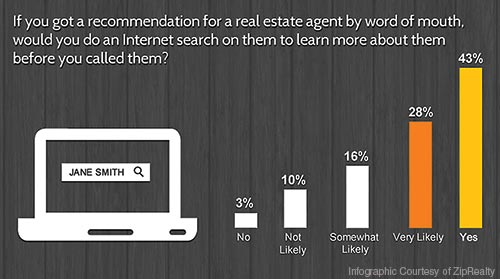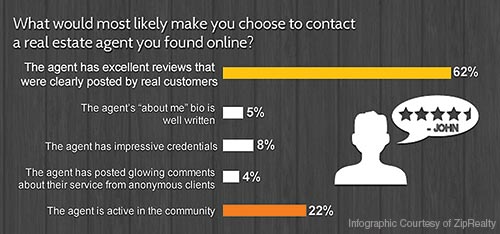You are viewing our site as an Agent, Switch Your View:
Agent | Broker Reset Filters to Default Back to ListWhat the Internet Is Saying About You
March 25 2014
Guest contributor Melissa Dittmann Tracey of REALTOR®Mag says:
 When consumers begin their hunt for real estate, you know where they turn: the Internet. But how do potential customers and clients find their way to you? Broadly speaking, word of mouth, personal connections, and even chance encounters are still the predominant ways people link up to a sales agent. But the Web is assuming a more prominent role in the decision-making process of buyers and sellers as they figure out who can best help them through one of life's most important and trying financial transactions.
When consumers begin their hunt for real estate, you know where they turn: the Internet. But how do potential customers and clients find their way to you? Broadly speaking, word of mouth, personal connections, and even chance encounters are still the predominant ways people link up to a sales agent. But the Web is assuming a more prominent role in the decision-making process of buyers and sellers as they figure out who can best help them through one of life's most important and trying financial transactions.
To be sure, the specter of online ratings and rankings provokes anxiety—even outrage—for some practitioners as the platforms themselves and types of information being shared are still in flux. But make no mistake: Consumers' expectations about using the Internet to find out whatever they can about real estate practitioners is headed nowhere but up. Last year, 12 percent of buyers said they used online recommendations while searching for an agent, up from 3 percent in 2001, and half of those buyers report being influenced by what they read online, according to the 2013 National Association of REALTORS® Profile of Home Buyers and Sellers.

The majority of customers who do receive word-of-mouth referrals say they're checking up on you, too, according to a ZipRealty survey of 2,500 buyers in 2012. People are vetting real estate practitioners in the same way they search for plumbers, doctors, and other service providers, using Google searches and review sites like Yelp and Angie's List.

On some sites, like Google's HomeLight, customers can view your transaction history and sales performance during their selection process. That practice leaves some practitioners uneasy. After all, evaluating the effectiveness of an agent is hardly a straightforward numbers game. Having the highest sales volume in your office doesn't automatically make you the best fit for a potential client given the many intangibles that go into a successful transaction.
But finding the right balance of information is vexing. The debate came into vivid relief last year with the beta test of a realtor.com® pilot program, AgentMatch, that displayed the sales performance data of real estate professionals in Boulder, Colo., and Las Vegas in an effort to assist consumers in their search for an agent. An online article about the test caused a minor social media explosion, leading realtor.com® to announce it would revive the effort later with a more comprehensive matching tool (more on that later).
And while some real estate professionals remain hesitant about allowing open access to performance data and customer-service ratings on factors such as knowledge, negotiation skills, and response time, others say increasing their transparency can build credibility in the business relationship.
To that end, more REALTOR® associations and brokerages are devising their own ratings and ranking systems, seeking to be the primary vehicle consumers turn to for that information. "Customer reviews and ratings online are inevitable," says Lanny Baker, CEO and president of ZipRealty Inc. The brokerage launched a voluntary, uncensored consumer review and rating tool for its agents in 2012. "If we as an industry don't take time to act on how we should present ourselves, our credibility, and our credentials online, someone else will do it for us."
The Houston Association of REALTORS® has gone through its own trial and error experience to arrive at a ratings system. In 2009, HAR launched an opt-in Client Experience Rating System, where customers can complete post-transaction surveys that review and rate agents based on their customer service. A year later, HAR began an experiment to provide customers even more information through a separate system called REALTOR® Match, in which performance metrics let consumers search for agents based on the number of transactions and listings in a designated ZIP code or neighborhood. The quantitative approach sparked outrage among some HAR members, and the program was cancelled almost as soon as it started.
Today, HAR's Client Experience Rating System continues to rely solely on customer satisfaction feedback. In its surveys, 90 percent of consumers say that agent ratings based on real customer feedback are helpful in selecting an agent. Still, only about 20 percent of HAR's members participate in the customer feedback program, and not all choose to display the results publicly online.
Sales Metrics: Will You Measure Up?
Certainly, online aggregators hungry for consumer traffic are putting your transaction history and sales performance front and center. A year ago, Trulia added a tool to enable agents to upload transaction histories to their profiles, but the decision to do so is in their control. Trulia spokesman Matt Flegal says that agents who do upload past sales history for free via its "sold listings" feature get greater visibility for their profile. The company declined to say how many agents are using this tool.
Meanwhile, Zillow has begun automatically uploading past sales data on agents' profiles, which it allows agents to edit for accuracy. The information includes the addresses of homes sold, sold date, and sales price, as well as a map displaying those sales, along with their active listings. Google also has jumped in with HomeLight, which ranks agents—in 34 markets so far—based on the transaction metrics that visitors deem the most important. For example, visitors can choose what they value most in a buyer's agent from one of three choices: an agent who "gets me the best price," "spends a lot of time with me," or "has lots of experience."
Realtor.com® remains committed to helping consumers make connections with practitioners, recognizing that an in-depth profile covering your expertise and experience is at least as valuable as your transaction history. But on the road to developing a new agent search tool, the AgentMatch beta test sparked pushback from agents who resented the emphasis on individual sales data that included list-to-price ratios and average days on the market for listed homes. Critics noted that the data didn't reflect team deals and held back newer agents who didn't have long transaction histories. "Stats don't tell the whole story," says Ernie Graham, realtor.com®'s senior director of product management. "A lot of people got emotional about [AgentMatch], but no one was seeing the complete product or complete experience of it. AgentMatch was only experimenting with one data set around transactions."
Graham says the program's intent was always to be just one piece of a larger agent search experience. Based on findings from consumer focus groups and real estate advisory groups, it plans to gear up a broader program that includes these five pillars:
- Experience: including transaction history, such as active listings, and reviews of your performance from past clients. (It would not include days on the market or list price to sale price ratio, which stirred some of the AgentMatch controversy.)
- Expertise: including REALTOR® certifications and designations; types of properties often sold; blogs or social networks that demonstrate specific knowledge, and your showing activity in an area.
- Personal connections: revealing any friends of friends you're connected with on social networks; your bios; and personal recommendations from clients.
- Brand: providing more information about the brokerage you're affiliated with and any involvement in a team.
- Responsiveness: detailing your average response time to customer inquiries. Graham says consumers put a lot of weight on agent responsiveness, potentially leveling the playing field for newer agents who do have the time and eagerness to respond immediately to inquiries.
"We want to [create] rich agent profiles and let consumers choose what is most important to them," Graham says.
Get Your Customers Talking
While Graham and his team at realtor.com® innovate for the future, there's one aspect of online reputation that many agents are already focusing on: customers' ratings and reviews. Some agents find the more customer talk they encourage, the better off they are.
"Clients have told me they've read great reviews about me," says Samer Kuraishi, a sales associate at A-K Real Estate Inc. in Germantown, Md. After every transaction, Kuraishi give customers a link to rate and review him on Zillow. "I use the Internet as leverage to building a great reputation—it shows this is who I am, this is what I can do for you. I don't have to sell myself. They come to me, and they already know my ability."
ZipRealty's survey of 2,500 buyers found that the No. 1 factor that would make buyers contact an agent they found online was "excellent reviews that were clearly posted by real customers." An honest review system of unfiltered, unedited comments was vital or buyers wouldn't trust the comments, the survey found.
"If a rating system isn't credible, transparent, authentic, and unedited, you actually do more damage implementing it," says ZipRealty's Baker. In 2012, ZipRealty launched an opt-in review tool for its agents, but any agent who opted in had to agree to let all comments appear—the good and the bad, unedited. Customers were asked to comment on everything from a agents' overall housing expertise to their local knowledge.
At first, only 5 percent of ZipRealty agents used it, says Baker, who said he fielded a lot of criticism about it from those who feared a negative comment would damage their business. For those who opted in, however, they gained credibility by exposing themselves to an uncensored rating model, and even a negative comment or two did not doom their business when the overall picture was positive, Baker says. What's more, the click-through rate on reviews was the highest of any links at ZipRealty's website, exposing those who participated to more potential customers online. Today, 84 percent of ZipRealty agents opt in.
Larry Romito, CEO of Quality Service Certification, a real estate–focused customer service company, views customer reviews as a key to raising professionalism and accountability in the business, since they put your customers' satisfaction in the forefront. His research shows that customers report the highest levels of satisfaction with real estate professionals who devote attention to counseling and needs assessment; availability and frequency of communication by the agent; thoroughness of the search process; negotiations; and attention to detail in contracts.
Last year, the National Association of REALTORS® funded a pilot with QSC to offer the "REALTOR® Excellence Program" to a number of REALTOR® associations, boards, and broker-owners. The program is operating in 24 local and state REALTOR® associations, Romito says. For those who participate, the company sends out a customer survey after every transaction, seeking detailed feedback on the agent's service. Agents can choose whether to make all customer feedback public online at RatedAgent.com or keep the information private. But no comments are ever edited, Romito says.
Romito says agents are still warming up to the idea of exposing their customers' sentiments online. Currently, there's an even split among those who say "yes, publish all comments automatically," those who say "let me see the results first before publishing all," and those who wish to keep the feedback private.
Whether you choose to publicize your ratings or not, embracing the feedback can make you a better agent, says Jeff Turner, CEO of RealSatisfied. Since 2012, RealSatisfied also has been helping real estate professionals collect post-closing survey feedback from customers, which forms the basis of their online profile. RealSatisfied feedback can be integrated with agents' Realtor.com® profile.
Turner says the program is not aimed at just gathering a quick testimonial or star rating. "There's so much more to be learned by explicit customer feedback," Turner says. "The ability to see exactly how your customer felt about various aspects of the transaction is beneficial. This is true on a case-by-case level and even more true when data begins to accumulate. What can be learned over time is valuable and shows you where to focus your training.
To view the original article, visit REALTOR®Mag.









